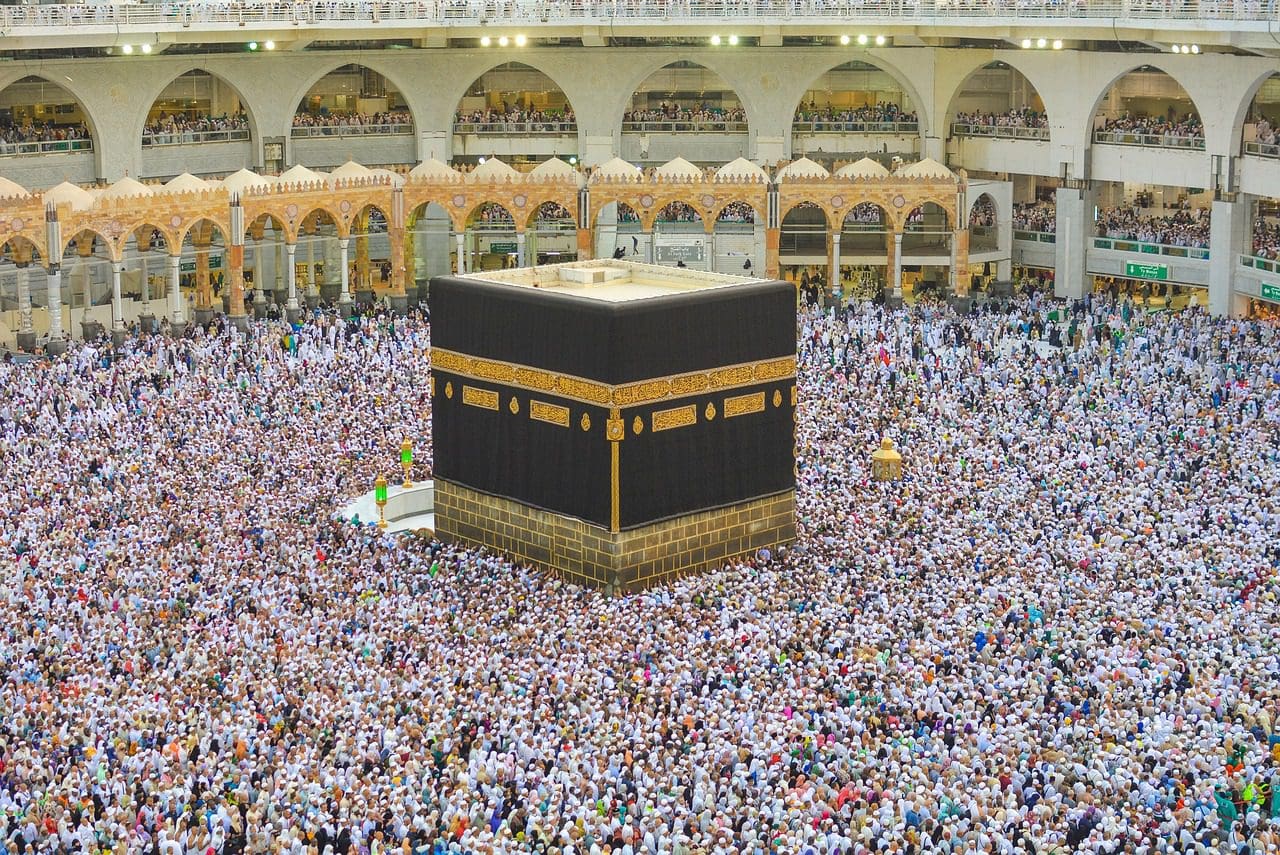Muslims do two types of holy pilgrimages as a sign of their belief and spirituality: Umrah and Hajj. Even though both Umrah and the Hajj are purification rituals, they are vastly different.
This article highlights the major differences and aspects of both the odysseys to make them easier to understand and comprehend.
Key Takeaways
- Umrah, a minor pilgrimage, can be performed any time throughout the year, while Hajj, a major pilgrimage, occurs annually during the Islamic month of Dhu al-Hijjah.
- Hajj is mandatory for Muslims who are physically and financially able, whereas Umrah is highly recommended but not obligatory.
- Hajj involves more rituals and longer duration than the simpler and shorter Umrah pilgrimage.
Umrah vs Hajj
The difference between Umrah and Hajj is that Umrah is an optional and less-stringent type of pilgrimage practised by Muslims, whereas Hajj carries a deeper and stronger sense of spirituality and hence is more stringent and compulsory. Umrah and Hajj are religious trips conducted by Muslims to seek Allah’s graces. This gives pilgrims religious merits and allows them to refresh themselves.

The first sort of umrah can be taken at any time except during the hajj months, but the second type can be conducted during the hajj months.
The compulsory activities for Umrah include taking Ihram after announcing the desire to undertake Umrah, completing Tawaf, performing Sayi between both the hills of Safa and Marwa and shearing or cutting a part of the hair.
Prophet Muhammad developed the ceremonies that were conducted throughout this voyage.
The first step in doing Hajj is to declare the desire to do so. As usual, you will conduct Umrah before Hajj, therefore, Ihram clothing will be worn in Mekkah.
Comparison Table
| Parameters of Comparison | Umrah | Hajj |
|---|---|---|
| Definition | The Umrah is a Muslim pilgrimage that can be performed at any period of year or in conjunction with the Hajj. | Hajj is an yearly Muslim pilgrimage that is regarded as one of Islam’s 5 pillars. |
| Duration | If there isn’t a large throng, Tawaf in Umrah takes approximately two hours. Tawaf can be completed in 3 to 4 hours if there is a huge audience. | The pilgrimage ceremonies last five to six days, starting on the 8th of Dhu al-Hijjah and concluding on the 12th or 13th of Dhu al-Hijjah. |
| Purpose | Umrah provides Muslims with an opportunity to renew their faith, ask forgiveness, and pray for their needs. | Hajj is said to have a spiritual value in that it allows Muslims to rejuvenate and replenish themselves. |
| True Meaning | “Umrah” implies “visiting a Sacred location.” | It is derived from the Arabic term ajj, which literally means “pilgrimage.” |
| Location | Mecca | Holy city of Mecca and Madina. |
What is Umrah?
The journey to Mecca, known as Umrah, is a lesser variant of the yearly Hajj pilgrimage. In Arabic, the phrase “Umrah” implies “visiting a populous location.”
Umrah is a psychologically spiritual moment of “quick fix,” and regardless of how busy it is, it may be finished in well under two hours.
Umrah can be undertaken by anybody at any time of each year, unlike Hajj, which is an annual pilgrimage to Mecca that must be conducted between the first ten days of the Muslim period of Dhul Hijjah.
There are two forms of Umrah, depending on whether one desires to undertake Hajj just after completion of Umrah rites: Al Umrah Al Mufradah (optional prior Hajj) and Umrah Al Tammatu (required after Hajj) obligatory.
The four actions of Umrah Al Mufradah are as follows: each grounding the traveller in the proper time approaching total repentance, each including the fulfilment of specific religious responsibilities and rites.

What is Hajj?
Hajj, sometimes spelt adjdj or hadj, is a Muslim journey to the sacred kingdom of Saudi Arabia that every adult Muslim is required to perform at least once in his period of existence in the world of mortals.
Adult Muslims are required to perform Hajj at least momentarily. They must be mentally sound, as well as physically and financially secure when making the trip.
This is reflected in the calendar every year since the Muslim calendar is based on the lunar year, and it is 10 to 11 days prior to the previous year. Hajj is anticipated to take place on and around August 9th 2019.

Main Differences Between Umrah and Hajj
- Umrah is significantly less expensive and less stringent when compared to the Hajj.
- Umrah can be undertaken at any time of the year, whereas the Hajj rituals are scheduled to take place between the 8th and 12th days of this month.

- https://www.islamichelp.org.uk/what-we-do/seasonal/qurbani/what-is-hajj
- https://thepilgrim.co/what-is-umrah/

The article does an excellent job of highlighting the critical differences between Umrah and Hajj. It is crucial information for anyone who is not familiar with these Islamic practices.
Agreed, the article is concise and informative, making it easy to comprehend the differences between the two pilgrimages.
The article is a compelling exploration of Umrah and Hajj, illustrating the religious, spiritual, and practical dissimilarities between the two pilgrimages.
The comprehensive nature of this article sets a high standard for understanding the complexities and differences between Umrah and Hajj.
The article effectively captures the essence of both Umrah and Hajj, providing a holistic perspective to readers.
This article provides insight into the religious and spiritual significance of both Umrah and Hajj. It is well-researched and offers valuable information.
Absolutely, the historical context and the comparison table provide a thorough understanding of these pilgrimages.
This is a comprehensive and educative article. A must-read for anyone who wants to understand the differences between Umrah and Hajj.
The article eloquently defines the differences and rituals involved in Umrah and Hajj, shedding light on their spiritual essence and practices.
Indeed, the article effectively presents the complexities and significance of both Umrah and Hajj, making it accessible to all readers.
This article adeptly conveys the distinctions between the Umrah and Hajj, offering valuable insights into the spiritual and practical aspects of Islamic pilgrimages.
Indeed, the detailed comparison and historical contexts provided in the article enhance the reader’s grasp of Umrah and Hajj.
The article is thought-provoking and enlightening. It serves as a great resource for individuals seeking knowledge about Umrah and Hajj.
This article is an invaluable source of information for comprehending the disparities between Umrah and Hajj. It offers a nuanced understanding of these religious rites.